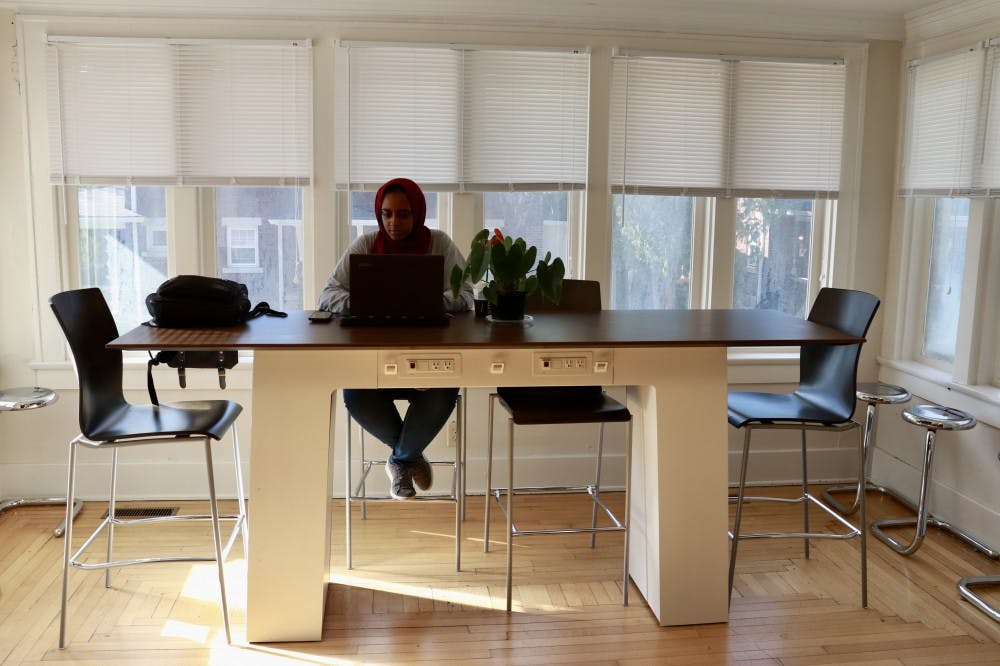IU’s Center of Excellence for Women in Technology is celebrating its fifth anniversary this fall.
CEWiT was founded in 2013 after members of IU’s faculty and staff came together to create a center for women across multiple disciplines to access and learn more about technology.
CEWiT’s director and co-founder Maureen Biggers said data has shown girls are leaving high school without enough exposure to technology, which leaves them unprepared to study it in college.
“A lot of people have the mindset that you either know it or you don’t,” Biggers said. “And if you don’t, then you don’t belong.”
Before creating the center, Biggers was the assistant dean for diversity and education in the then-School of Informatics and Computing, where she worked to increase the number of women enrolled in the school. She said it became clear to her that the study of technology was not limited to computer science majors.
“Today, it touches just about every single career under the sun,” Biggers said.
Biggers said while other schools may have women’s groups for engineering and technology students, CEWiT is for students of any major, not just science, technology, engineering and math majors.
Junior Natalia Johnson started at IU as a marketing major, but changed to informatics after taking an introductory class about the subject.
Johnson said in an email she heard about CEWiT when an intern visited her class, prompting her to look into the center and its programs. There she found a comfortable environment to study informatics that she couldn’t find in the classroom.
“When you’re a woman in STEM, you start to realize pretty quickly that you’re in the minority and the classroom setting can get a little intimidating,” Johnson said.
Now she is employed as an office assistant for the center.
“I joined the CEWiT team because I wanted to give back to the community who so willingly helped me through my journey as an IU student,” Johnson said.
IU first lady Laurie McRobbie is a co-founder and advisory council chair for CEWiT. She said it’s interesting to see how IU’s abundance of humanities programs interact with technology.
“It gives us a real advantage, I think, in thinking very broadly about access and involvement and competence in technology because we see it happening in every field,” McRobbie said.
She said IU is a leader in the applications and uses of informatics and computer science, including teaching, research and technical infrastructure.
“As part of that leadership role that Indiana University plays, it then becomes also important that the student body across the board is able to participate in various ways in that technology rich environment,” McRobbie said.
CEWiT’s membership has grown over five years to include students, faculty and alumnae from a wide variety of backgrounds and majors.
Biggers said CEWiT currently has 3,000 women who are part of the center’s affiliate groups, such as Black Women in Technology and Women Who Code, as well as around 800 faulty partners and 2,000 alumnae.
During this time, CEWiT has also launched multiple initiatives for IU students interested in technology. Some include an eMentor program with alumnae, a research program that pairs first-year and sophomore students with faculty members and an Empowerment Lunch and Learn series.
CEWiT’s programs are not just focused on women, Biggers said.
Advocates and Allies is a program created by male CEWiT faculty partners to educate themselves and other male faculty on how to promote equity within their departments. Biggers said the center also has a new student affiliate group specifically for men this semester.
Biggers said she is excited by men’s involvement with CEWiT because they are important partners in combating sexism.
“If the male students don’t learn what to look for and what to do when they go into the workforce, nothing is going to change,” Biggers said.
As CEWiT’s leaders celebrate its fifth anniversary, they are also looking towards the center’s future. Both Biggers and McRobbie said they hoped to see the center become a base for national research about collegiate women and technology.
“There are a lot of researchers at other institutions that are looking at the gender gap, looking at causes, looking at remedies, but there really isn’t a single place you can go and get access to that kind of research,” McRobbie said. “We could become that.”




